| Reviews & Columns |
|
Reviews DVD TV on DVD Blu-ray 4K UHD International DVDs In Theaters Reviews by Studio Video Games Features Collector Series DVDs Easter Egg Database Interviews DVD Talk Radio Feature Articles Columns Anime Talk DVD Savant Horror DVDs The M.O.D. Squad Art House HD Talk Silent DVD
|
DVD Talk Forum |
|
|
| Resources |
|
DVD Price Search Customer Service #'s RCE Info Links |
|
Columns
|
|
|
Trust
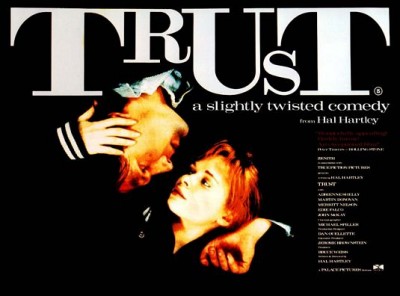
Please Note: The images used here are taken from promotional materials and filmmaker Hal Hartley's website, not the Blu-ray edition under review.
Writer/director Hal Hartley's take on lower-middle- and working-class American life (uncertain, rickety rungs on the social ladder, and he's observant and sensible enough to casually depict them that way) is one of the more deeply unusual things independent cinema managed to smuggle through that commercially arid, artistically rich window of time between Blue Velvet and the coming of Tarantino (Hartley's first feature, The Unbelievable Truth, was released in 1989). Hartley's work at its best is simultaneously cerebral, stylistically and narratively arch, deadpan-funny, and unabashedly rife with philosophical, moral, ethical, aesthetic, and social problems, which he brings up and deals with in a manner that decisively rejects both escapist fantasy and traditional, "believable" realism. His characters suggest something like Robert Bresson's stone-faced, line-delivering "models" (don't ever call them "actors") cut loose from their French-Catholic seriousness and finding themselves adrift in the helium chamber of contemporary American experience, floating bemusedly through their at once drearily workaday and hyper-eventful lives in search of the sense of gravity and consequence that's comically missing in this strange landscape. In his 1990 film Trust, set in precisely the same big-haired, struggling, bitterly proud and materialistic-by-necessity Long Island milieu that gave rise to Amy Fisher (and Hartley himself), two such characters -- an overconfident high-schooler (the late, great Adrienne Shelly, director/costar of Waitress) who's just found out she's pregnant and a principled, well-read, frustrated computer expert/technician (Martin Donovan, The Opposite of Sex, Saved!), who are both guilt-ridden and emotionally trapped by their families, and who have, for better or worse, glimpsed a more serious and thoughtful side of existence through the resolutely un-serious fog that surrounds them -- reluctantly and haphazardly fall in love (or at least into "admiration, respect, and trust") with each other.
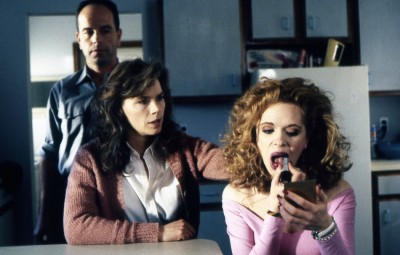
We first meet Maria Coughlin (Shelly) at the point when her days of nonchalantly getting kicked out of school for her sass, teasing her hair, shopping for hot new tube tops, and dating a lunkhead football player are coming to an end. The first words uttered in the film may be Maria's terse order to "Gimme five dollars" directed with overly made-up, gum-snapping attitude at her father, followed by what's apparently a routine family squabble, but this time, her single pregnancy and plans to drop out, accompanied by her habitual contemptuous defiance, literally kill her father (via a heart attack). Her mother rejects her, temporarily banishing her from the house; her boyfriend wants nothing to do with her or the baby; and her divorced sister, Peg (Edie Falco), recently returned home, lives in a daze, waiting tables, flirting, drinking, and remaining world-wearily numbed to all of their dead-end lives. Meanwhile, during his workday at a nearby computer manufacturer, the razor-sharp, smart, and coolly alienated Matthew Slaughter (Martin Donovan, The Opposite of Sex) takes out his rage over the relentless emotional and physical abuse administered by the father he still lives with by putting the head of a weasely manager in a vise, promptly getting himself fired and earning even further derision from his dad. Finding herself left absolutely alone to deal with her careless pregnancy, Maria's just been doused with one form of the cold, harsh reality that Matthew's lived in his whole life, and when they meet, they're both at the ends of their ropes and in search of something more meaningful, warily recognizing each other as kindred spirits and drawn tenuously together in common dissatisfaction with their too-narrow choices.
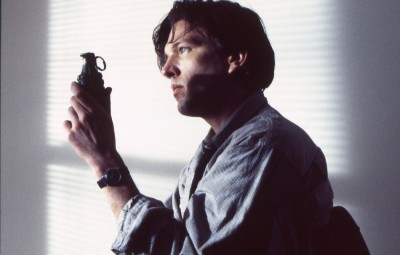
Upon seeing Maria's and Matthew's connection blossoming by fits and starts, their families instantly display a potent and very recognizable mixture of possessive, protective love and rank envy/resentment: They hate nothing more than to see one of their own aiming for something higher or better, and maybe escaping and abandoning them; neither Maria's brittle, tough-as-nails mother (who, for one example of Hartley's rat-a-tat verbal humor, rebukes her daughter for her father's death in a most severely condemnatory way, promising her a lifetime of such chastisement, and then inquires without taking a breath, "Have you had anything to eat?") nor Matthew's father, nor any of the other people they come across, believe that there could be anything better than their mercenary, hardscrabble lives. Even after Matthew, meaning to marry Maria and raise her baby, moves in with her and what's left of her now-fatherless family, his father tracks him down and pushes him to the breaking point of physical confrontation, while Maria's mother gets him drunk and tries to seduce him, using her other daughter as bait, in order to subvert a relationship that's much too idealistic for her to approve of. Their lives, to the dignity-seeking Matthew and Maria's dismay and despite their yearnings and efforts to the contrary, become a mix of depressing status-quo anomie and tacky soap opera: Maria goes back and forth on whether or not to terminate her pregnancy; Matthew vacillates about taking on the kind of marital and paternal responsibility that means sucking up his principles to get along in a corner-cutting, profit-grubbing work environment, all the while hanging onto, as some sort of ominous last resort, a hand grenade his father brought back with him from Korea. Matthew, with his sincere and deep love of Beethoven and the heady books littering his room, has the lively mind and independent spirit of a scholar or philosopher; Maria, innocent until now of the value of thinking beyond the immediate moment, aspires to be more like Matthew, making an actual physical transformation from mallrat to sweet, bespectacled, thesaurus-carrying seeker of truth and wisdom (albeit one who must be gently reminded by Matthew that it's pronounced "naïve," not "knave.")
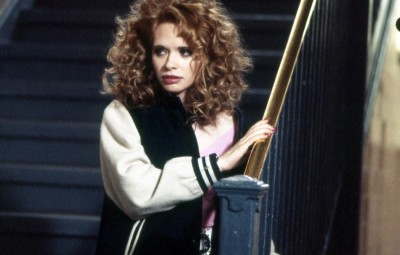
That's not even all of this sad-sack story's convolutions (there's also the Hardy Boy/Nancy Drew subplot in which Maria and Matthew attempt to solve the kidnapping of a baby, a crime half-witnessed by Maria, outside a convenience store), but suffice it to say that there's an absurd and irresoluble pile-up of events, both the ones that happen to Maria and Matthew and the ones they cause to happen. And that grenade of Matthew's keeps popping up, reminding us inevitably of Chekhov's rule about not introducing artillery in the first act unless it goes off before the curtain drops.... Ultimately, though, it only sort of ends with a bang; Trust's two protagonists are on a long-term, maybe endless quest, floundering and indecisive in their search for something, anything, good and right in their lives, and the film, with all respect and affection, leaves them that way, unresolved but better aware of themselves, each other, and the world around them. But that's not to say that Trust offers no closure of any kind. Taken as the tale of a young woman's trajectory from run-of-the-mill mindlessness to morally sentient being, it can be said to have a beginning, middle, and end, and if it leaves you hanging insofar as what specific actions the characters might be taking as a result of their fierce, clumsy but noble attempts to wake up to some larger reality, the peak it strands you on is one from which you can see the irreversibility of Maria's awakening clearly enough to be both exquisitely satisfied and deeply moved.
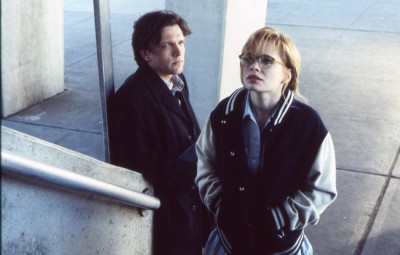
If Trust's cascade of overblown plot twists sounds like fodder for some typically overwrought, cheesy serial on daytime TV, its odd confluence of highbrow themes with lowbrow story and characters is delivered to us by perhaps the only pair of filmmaking hands that can make the right kinds of sparks fly when those disparate elements meet. Hartley, working with cinematographer Michael Spiller and editor Nick Gomez, creates unusually syncopated but startlingly eccentric rhythms with the timing of cuts and the movements of characters, and his starkly nondescript compositions make empty-feeling, near-abstract spaces out of the characters' streets, homes, and workplaces. It's a style that's inspired, finely and very effectively honed, calibrating Hartley's uneasy mix of sitcom/soap and tragedy until it's as snippily, earthily hilarious (and unexpectedly deep) as Roseanne and as tragic (and unexpectedly hilarious) as Waiting for Godot. On the extremely tightly-controlled dramatic and performance side of things, Hartley employs rapid-fire, sarcasm-fueled exchanges that build non-sequitur atop non-sequitur; "characters" that can turn on a dime from near-archetypical caricatures to outrageous idiosyncrasy; verbalized quasi-philosophical meditations and/or screeds; and plain ol' straight-ahead slapstick -- sometimes all in the same sequence -- to create a world where emotions are hidden so deeply and yet become so clearly present that they catch you by surprise, taking huge risks to elicit feelings and responses in such a way that you don't see it coming until it's too late and you're already overcome. The grindingly common pettiness and the noblest impulses in human life butt up against each other and form a blurry jumble; the film's earnest moral and philosophical sensibility and self-conscious dramatic contrivances clash in a way that actually jars. But in Hartley's sharply honed, blackly comic vision of the world, despite the artifice worn on the sleeve, it's all plausible in the ways that really count, because the assumption underpinning everything is that tacky soap-opera circumstances are what life actually hands a great many people, with no affluent glamorousness to soften the blow like it so often does on TV, and it's the struggle of those lucky enough to glimpse the absurdity or injustice in that raw deal to try, however (hysterically) pathetic or foolish or hopeless their attempts, to make their humble lives something worthy of them, perhaps even while managing to somehow fatalistically laugh along. Trust starts off seeming like it couldn't possibly have anything more to offer than a mordant laugh-along with its hapless characters, either too smart and sensitive for their own good or trying to be, and their conundrums. By the end, it has slyly, imperceptibly revealed itself as a rich, sardonic, exquisitely tender fable about human connection, aspiration, and morality, the rare movie comedy that leaves us pondering the serious questions of what makes a love worthy, and what makes a life worth living.
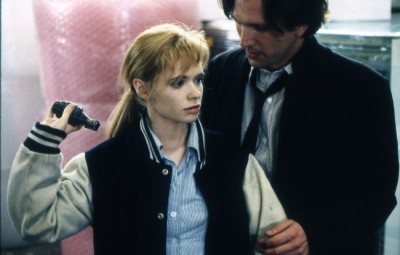
THE BLU-RAY DISC:
This AVC/MPEG-4, 1080p transfer of Trust presents the film at a 1.78:1 widescreen aspect ratio that looks quite good; there's a very rare "pop" on the film surface that could presumably have been eliminated in the authoring, but the film's colors are vivid, skin tones look natural, blacks are solid, there's surprisingly little edge enhancement/haloing (or any other compression artifacts), the precious film grain has, thankfully, not been too smoothed away with digital noise reduction: Virtually every frame looks pleasingly film-like, and the transfer overall sufficiently approaches the experience of seeing the movie projected.
Sound:The DTS-HD Master Audio 1.0 soundtrack captures the film's original mono sound superbly; there's no hiss, crackle, or any other sonic flaws, and the dialogue, music (particularly the score, which sounds remarkably rich and deep), and ambient sound are all sparkling clear.
Extras:
"Upon Reflection: The Making of Trust," an 18-minute documentary made in 2005 by perennial Hartley actor D.J. Mendel, reunites the director and line producer Ted Hope with actors Adrienne Shelly and Martin Donovan for an off-the-cuff, affectionate, and surprisingly candid (it was hardly an easy shoot) recollection of their collaboration on the demanding Hartley's second feature.
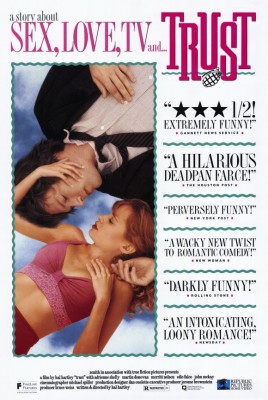
Through sheer uncompromising stylistic relentlessness and force of will, Hal Hartley's Trust takes its Lifetime-movie story of a pregnant teen (Adrienne Shelly), a handsome rebel too smart to work for the man (Martin Donovan), and myriad convolutions involving a kidnapped baby and a hand grenade, and forms it into something astringently powerful, thoughtful, and profoundly moving. Hartley's almost abrasively cerebral, insistently deadpan-verbose, anti-dramatic, anti-naturalistic approach reached its maturity with this, his second film; the sets and locations themselves are faultlessly outer-urban-anonymous and kitchen-sink-realistic, but the framings and mise-en-scène are precisely minimalist and simple-clean, the dialogue self-aware and crystalline, the performances purposely directed to be read-not-performed, zero-degree and expressionless as David Mamet actors, all for a style and tone that both elevates and purifies the material into something as fine and beautifully clarified as it is flat-out droll to an extreme not seen since the height of screwball. Hartley looks at the most humdrum and superficially tacky lives from a purposely odd, estranging, self-consciously artificial perspective as a way of revealing their urgency and value, the possibility in them for random, arbitrary good to sprout from between the cracks of modern-life futility. Henry Fool (1997) is the highest pinnacle of Hartley's idiosyncratic M.O., and probably the best place to start for those not yet familiar with his work. But the more minor-scale, already confidently controlled and fully-achieved Trust really shouldn't be missed, either; it has its own bold, well-conceived interplay of stylized archness and humane affection, and it shows him well on his way to perfecting his singular, paradoxical mix of disparate narrative and stylistic elements, his at once coolly brainy and genuinely affecting brand of cinematic storytelling. Highly Recommended.
|
| Popular Reviews |
| Sponsored Links |
|
|
| Sponsored Links |
|
|
| Release List | Reviews | Shop | Newsletter | Forum | DVD Giveaways | Blu-Ray | Advertise |
|
Copyright 2024 DVDTalk.com All Rights Reserved. Legal Info, Privacy Policy, Terms of Use,
Manage Preferences,
Your Privacy Choices | |||||||













